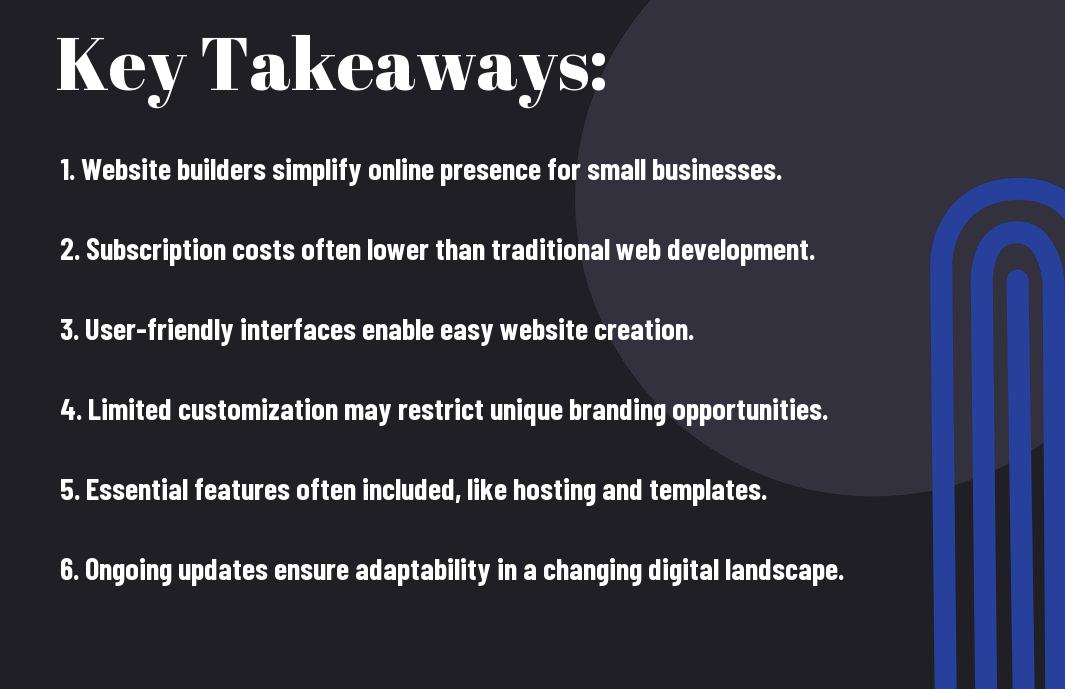With the digital landscape evolving rapidly, you may be wondering if website builders are truly cost-effective solutions for your small business. These platforms promise user-friendly design and functionality at a fraction of the cost of hiring a web developer. However, as you navigate your options, it’s important to weigh the benefits against potential limitations that might affect your online presence. From design flexibility to hidden costs, this post will guide you through the factors you should consider before choosing a website builder for your enterprise.
Key Takeaways:
- Website builders offer affordable options for small businesses, allowing them to create a professional online presence without the high costs associated with hiring web developers.
- These platforms provide necessary features like templates, hosting, and customer support, making it easier for non-technical users to build and manage their websites.
- While website builders can be cost-effective, businesses should assess their specific needs and growth plans to determine if they require more advanced functionality that may necessitate custom development in the future.

Understanding Website Builders
Before exploring into the world of website creation, it’s vital to grasp what website builders are and how they operate. These platforms simplify the web development process, allowing you to design and launch your site without needing extensive technical skills. Whether you need a personal portfolio or an e-commerce site, website builders offer user-friendly tools to help you establish your online presence quickly.
Definition and Functionality
Between numerous options available, website builders are software tools that enable you to create websites using pre-designed templates and drag-and-drop features. They often provide various functionalities such as hosting, SEO tools, and e-commerce capabilities, making it easier for you to manage all aspects of your website from a single platform.
Popular Website Builder Options
Definition of popular website builder options usually includes platforms like Wix, Squarespace, and WordPress.com. Each of these alternatives offers unique features tailored to different needs. For instance, Wix is known for its creativity and flexibility, Squarespace shines with striking design templates, while WordPress.com offers extensive customization through plugins.
Another notable option is Shopify, ideal for e-commerce businesses, as it simplifies online store setup and management. Meanwhile, Weebly is great for beginners, providing a clear interface for those new to website creation. When choosing the right platform, evaluate your specific needs and ensure you select one that aligns with your business goals, as the right website builder can significantly enhance your online presence.
Cost Analysis of Using Website Builders
If you are considering a website builder for your small business, it’s imperative to weigh the costs against the benefits. While the initial investment may appear low, you need to evaluate both setup costs and ongoing maintenance expenses to determine the true value of such a platform for your digital presence.
Initial Setup Costs
Before you probe selecting a website builder, it’s important to assess the initial setup costs. These may include subscription fees, domain registration, and any necessary integrations. Although most website builders offer affordable plans, unforeseen expenses can arise if you require premium features or custom templates.
Ongoing Maintenance Expenses
Behind the scenes, ongoing maintenance expenses can add up over time. These typically include subscription renewals, updates, and perhaps additional costs for technical support or premium features that enhance your website’s performance.
It is important to note that while many website builders advertise low monthly fees, you may encounter additional costs for features like e-commerce capabilities, SEO tools, or even bandwidth overages. Failing to account for these recurring expenses could lead to a significant financial commitment in the long run. By being proactive and understanding the potential costs, you can make a more informed decision about whether a website builder is a genuine fit for your business needs.
Advantages of Website Builders for Small Businesses
Many small business owners are turning to website builders as they offer a range of advantages that can streamline online presence creation. These platforms typically require minimal technical knowledge, allowing you to develop a professional-looking website quickly. With various templates and customization options, you can create a site that truly reflects your brand identity without incurring hefty design costs.
Time Efficiency
After utilizing a website builder, you will find that it significantly cuts down the time required to launch your online presence. Traditional website development often involves lengthy processes, from hiring a developer to extensive coding. In contrast, with drag-and-drop functionality and pre-designed templates, you can have your website up and running within a matter of hours or days.
User-Friendly Interfaces
Around website builders, you’ll notice that most offer user-friendly interfaces designed with non-technical users in mind. This approach eliminates the need for coding skills, empowering you to build and manage your website without external help.
Consequently, the intuitive design of these platforms allows you to navigate effortlessly and update your site’s content with ease. This means that even if you’re not tech-savvy, you can still make changes as needed to keep your content fresh and relevant. Moreover, with built-in tutorials and customer support, you can quickly overcome any minor obstacles you may encounter, ensuring a smooth experience throughout your website management journey.
Limitations and Challenges
Your journey with website builders may come with several limitations and challenges that you should consider before committing. While these platforms offer convenience, they often lack the versatility and features that a growing business will require, particularly as your digital presence evolves.
Customization Constraints
Across various website builders, you may encounter significant customization constraints that could hinder your ability to tailor your site precisely to your brand’s vision. The templates often have fixed layouts and limited design options, meaning that achieving a unique look may be more challenging than you anticipated.
Potential SEO Limitations
Around website builders, potential SEO limitations can arise that impact your site’s visibility. While most platforms provide basic SEO tools, they might not offer the advanced options necessary to help you fully optimize your site for search engines.
Limitations such as restricted access to backend code and limited meta tag editing can substantially hinder your site’s search engine optimization efforts. This means that while you can implement basic practices, you might miss out on advanced strategies that could lead to improved rankings and traffic. Additionally, site speed can also be an issue, as many website builders come with bloated templates that slow down load times. If you’re serious about maximizing your digital presence, it’s important to weigh these potential drawbacks against the convenience offered by these platforms.
Comparing Website Builders to Custom Solutions
All website solutions have their merits and drawbacks. Below is a comparison of website builders and custom solutions to help you assess which might be the best fit for your small business:
| Website Builders | Custom Solutions |
|---|---|
| Lower initial costs | Higher upfront investment |
| Quick setup and deployment | Longer development time |
| Limited customization options | Fully tailored to your needs |
| Plugins and templates available | Unique design and functionality |
| Ongoing subscription fees | One-time payment (usually) |
Cost-Effectiveness of Custom Solutions
Among the most significant advantages of custom solutions is their adaptability. While the initial costs may be higher, the personalized approach means that you are investing in a website designed specifically for your business needs, potentially saving you money on updates and modifications in the long run.
Long-Term Value Considerations
To maximize your investment, it’s necessary to consider the long-term value of your website. While website builders may offer instantaneous results, they often come with ongoing costs that can add up, undermining their initial affordability. Custom solutions, despite their higher upfront investment, may ultimately provide better return on investment due to their longevity and tailored nature.
Indeed, the long-term value of your website plays a pivotal role in your decision-making. By opting for a custom solution, you’re not just paying for a website; you’re aligning your online presence with your evolving business goals. This may lead to a stronger brand identity and enhanced customer engagement. Furthermore, custom solutions can adapt to changes in technology and consumer demands, offering better scalability over time. In contrast, the rigid nature of website builders might limit your growth potential as your business expands or changes direction. Therefore, understanding both options is necessary in securing your business’s digital future.
Case Studies: Success Stories and Failures
Despite the mixed results that many small businesses experience with website builders, there are compelling case studies that highlight both success and failure in this area:
- FitSmallBusiness: Reported that a jewelry store saw a 40% increase in sales within three months of launching their website with a builder.
- Inc.com: Noted a restaurant chain that expanded its customer base by 150% after redesigning its site using a popular builder.
- WebsiteToolTester: Found that 30% of small businesses using DIY website builders reported traffic growth exceeding 300% within a year.
- HubSpot: Highlighted a local gym experiencing a 50% boost in membership sign-ups after introducing an easy-to-navigate website.
- Business News Daily: Cited instances where shop owners struggled, with 25% reporting technical issues that resulted in more than a 30% drop in sales.
Businesses Thriving with Website Builders
Beside the varying outcomes, many businesses are thriving by leveraging the capabilities of website builders. For instance, a small boutique increased its online sales by 70% within six months by utilizing a builder’s e-commerce features. Similarly, a local cafe garnered 200 new customers per month after implementing a blogging feature, showcasing the importance of consistent content updates.
Lessons Learned from Negative Experiences
Across the landscape of website builders, some businesses learned valuable lessons from their negative experiences. Cases reveal that poor website design significantly hampers user experience, leading to a drop in customer engagement. Failing to optimize for mobile, for instance, has resulted in a *50% decrease in traffic* for some businesses that prioritized aesthetics over functionality.
Lessons from failures often center on poor planning and lack of technical support. When you create your website, choosing a platform without considering your specific needs can lead to disastrous results. For example, businesses that skimped on mobile optimization faced a staggering 75% loss in potential customers not willing to navigate a cumbersome site. Furthermore, neglecting SEO best practices has left many businesses scrambling, with reports indicating that up to 60% experienced significant visibility issues. Understanding these pitfalls is imperative for turning your website into a successful digital asset.
Final Words
Conclusively, website builders can indeed be cost-effective solutions for your small business in the digital age. They offer user-friendly interfaces and customizable templates that enable you to establish a professional online presence without extensive technical knowledge or a hefty budget. By leveraging these tools, you can efficiently manage your website while focusing on growing your business. However, it’s necessary to evaluate your specific needs and future scalability before committing to a particular platform. With the right choice, you can optimize your online visibility and enhance customer engagement effectively.
Q: What are the primary benefits of using a website builder for small businesses?
A: Website builders offer several benefits for small businesses, including affordability, user-friendly interfaces, and time-saving features. They usually provide customizable templates that allow users to create a professional-looking website without needing extensive design or coding skills. Additionally, many website builders come with built-in tools for search engine optimization (SEO), e-commerce functionality, and mobile responsiveness, which can help small businesses establish a strong online presence quickly and effectively.
Q: Are website builders suitable for all types of small businesses?
A: While website builders are suitable for many small businesses, their effectiveness can vary based on the specific needs and goals of the business. For service-based businesses, such as consultants or freelancers, a website builder can provide a simple solution to showcase services and customer testimonials. However, businesses with complex functionalities, such as larger e-commerce platforms or those requiring extensive custom features, might benefit more from a custom-built website. It’s crucial for business owners to assess their unique requirements before choosing a website builder.
Q: How do website builders compare to hiring a professional web developer in terms of cost-effectiveness?
A: Generally, website builders tend to be more cost-effective than hiring a professional web developer, especially for small businesses with limited budgets. Website builders typically operate on a subscription model, with pricing that covers hosting, maintenance, and software updates. In contrast, hiring a web developer usually involves upfront costs for design and implementation, along with ongoing expenses for maintenance and updates. For small businesses looking to maximize their budget while establishing an online presence, website builders can offer significant savings without sacrificing quality.


